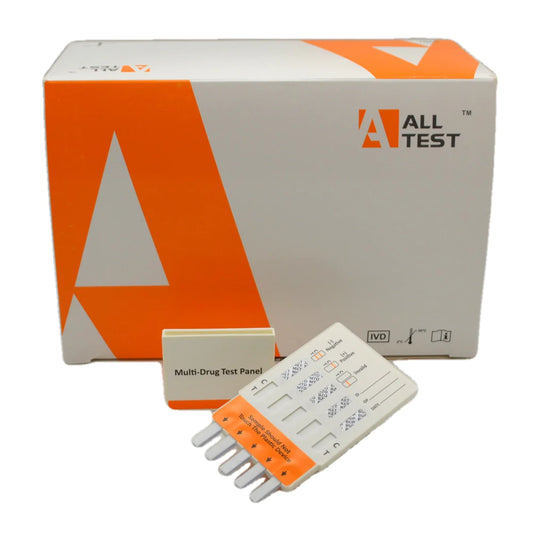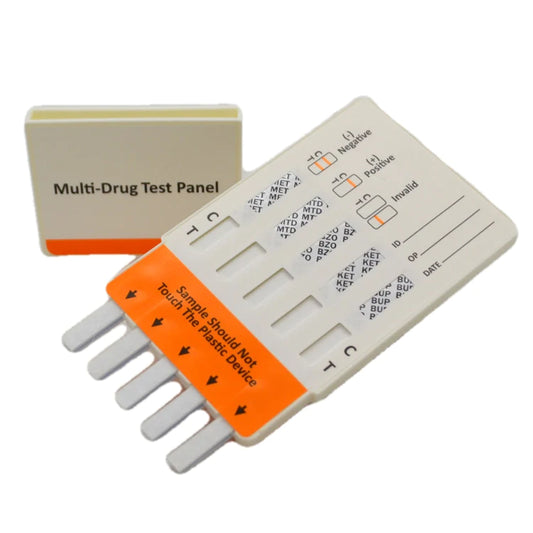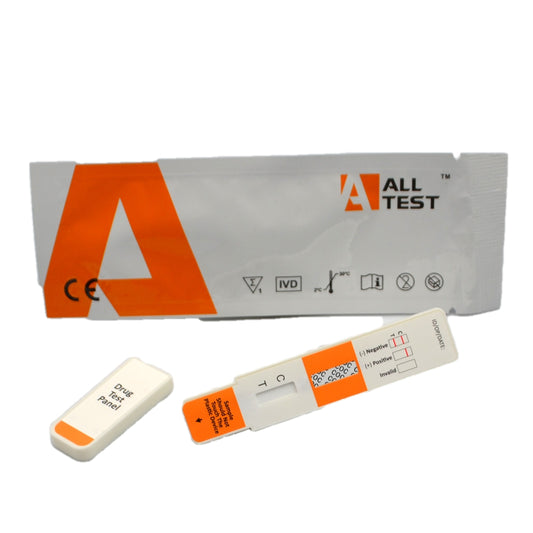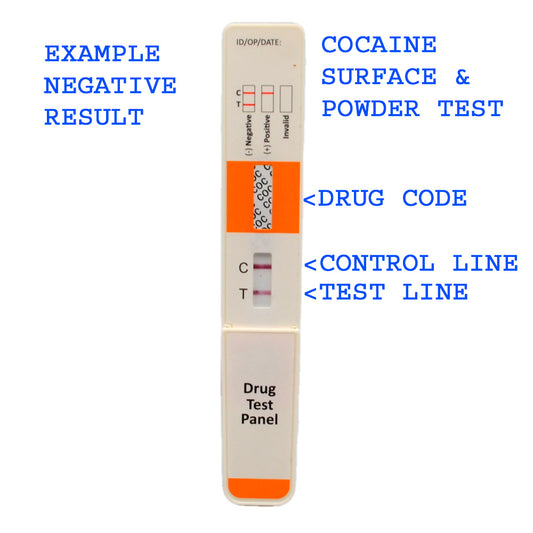Collection: Drug Test Surface
Surface drug testing kits
Surface drug test kits are used to detect and identify drug residues on surfaces in your home, workplace or office. Surface drug tests can also be used as a drug identification kit to test powders to see what substances they contain. You can see our full range of drug testing kits at our drug testing kit website UK Drug Testing.
-
ALLTEST Surface And Powder Multi Drug Identification Test Kit - 10 PANEL DRUG TEST
1 reviewRegular price From £8.40 GBPRegular priceUnit price / per -
Cocaine Detection Surface Wipe Drug Test Kit.
1 reviewRegular price From £4.25 GBPRegular priceUnit price / per
Surface drug test kits
Surface drug test kits are tools designed to detect the presence of illicit substances or drug residues on surfaces such as countertops, furniture, electronics, or even personal items like clothing or bags. They are commonly used in environments where there is suspicion of drug use, such as schools, workplaces, homes, or public facilities. These kits help identify contamination without testing a person directly.
What substances can they detect?
Commonly detected drugs include cocaine, amphetamines, opioids, methamphetamines, MDMA, and cannabis. Some advanced surface drug test kits can now test for multiple substances at once.
Key Features of a surface drug test
- Non-Invasive: No direct interaction with individuals is required; they test objects or areas.
- Types of detection: They can identify drugs like cocaine, methamphetamines, opioids, marijuana, and other controlled substances.
- Ease of use: These surface drug test kits involve simple swabbing of a surface, with the prongs of the drug test kit ,and then application of a buffer
- Quick results: Results are usually available within minutes.
Common uses of drug residue test kits
- At home: Parents might use them to check for drug residues in their children’s rooms or belongings.
- Workplaces: Employers may use them as part of safety measures or drug-free policies.
- Schools: Administrators can use them to detect drug-related activities.
- Law enforcement: Officers might use them during investigations or routine checks.
Types of surface drug test kits
- Colorimetric Swabs: Detect drugs through a colour change when swabbed and exposed to a reagent.
- Immunoassay test strips: Use antibodies to detect specific drug compounds.
- Advanced Analysers: Portable electronic devices provide precise readings for multiple substances.
Considerations
- Accuracy: False positives can occur, so further confirmation (like lab testing) may sometimes be necessary.
- Specificity: Some kits are specific to certain drugs, while others are broad-spectrum.
- Legal and ethical: Always ensure compliance with local laws and respect privacy when using such kits.
Surface drug test kits can also be used to test tablets or unknown substances, but with certain considerations:
Testing Tablets or Substances
You can gently rub the test over a powder to collect residue or crush a small portion of a tablet for testing.
Considerations
- Appropriate test kit: Ensure the drug test kit is designed to detect the specific substances you suspect. Some kits are targeted for specific drugs (e.g., opioids, amphetamines, MDMA).
- Quantity: Only a very small amount of the tablet is needed for testing.
- Contamination: Avoid contamination of the sample or the test area, as this could lead to false positives or negatives.
- Legality: Be cautious when handling or testing unknown tablets, as possession of certain substances is illegal.
Accuracy and limitations
- Screening tool: Surface drug test kits are typically preliminary screening tools. For definitive results, substances should be sent to a lab for chemical analysis.
- Substance complexity: If the tablet contains a mixture of ingredients, the test might not identify all the components.
Surface drug test kits are also known by several other names, depending on the context and their specific use.
These alternative names include:
- Drug Residue Test Kits - Highlighting their ability to detect trace amounts of substances on surfaces.
- Narcotics Detection Kits - Used to emphasise detection of narcotics.
- Field Drug Test Kits - Often used by law enforcement or in outdoor/field environments.
- Portable Drug Testing Kits - Refers to their convenience for on-the-go use.
- Chemical Spot Test Kits - Based on the chemical reaction method of detecting drugs.
- Trace Drug Detection Kits - Focuses on identifying small traces of drugs.
- Surface Swab Drug Tests - Describing the swabbing method used in the kit.
- Drug Surface Test Strips - Referring to specific kits that use strips for analysis.
These names are interchangeable and often used in retail and professional settings to describe kits that test surfaces or items for drug residue. They may vary slightly based on the target audience (e.g., workplace vs. personal use) or the specific drugs detected.
How accurate are surface drug test kits?
The accuracy of drug residue surface drug test kits can vary based on the type of kit, the substances being tested for, and the testing conditions. Generally, these kits are designed as preliminary screening tools rather than definitive tests.
Here’s an overview of their accuracy:
- High sensitivity: Many drug surface test kits are sensitive to even trace amounts of drug residue, making them effective for initial detection. However, they may occasionally produce false positives due to contamination or cross-reactivity with similar substances.
- Specificity: Some kits are designed to detect specific drugs (e.g., cocaine or fentanyl), which improves accuracy for those substances but limits broader detection capabilities.
- User handling: Proper use, including following instructions for swabbing and reagent application, significantly affects accuracy. Mishandling or using an old/expired kit can lead to unreliable results.
- Confirmatory testing: Positive results from a surface drug test kit are typically considered presumptive and require laboratory confirmation (e.g., using GC-MS) for legal or formal purposes.
- Reported accuracy rates: Manufacturers report accuracy rates of over 90% for detecting certain substances under ideal conditions, but these rates can decrease in real-world scenarios due to environmental factors or surface interference.
Surface drug test kits are useful for quick and non-invasive checks but should be supplemented with laboratory testing for precise identification and confirmation. For workplace, legal, or critical investigations, lab analysis is always the gold standard.
What other drug test kits are available?
If you need to test an individual for drug use, urine and saliva drug test kits are also available. Urine drug tests are highly effective for detecting recent and past drug use, as many substances are excreted through urine and remain detectable for days or weeks, depending on the drug. These drug test kits are often used in workplace testing, rehabilitation centres, or law enforcement and can screen for various substances, including amphetamines, opioids, THC, and cocaine.
Saliva drug test kits, on the other hand, are non-invasive and suitable for detecting more recent drug use, typically within a 24- to 48-hour window. These are especially useful in scenarios requiring rapid screening, such as roadside drug tests or random workplace checks. Both options are easy to use, provide quick results, and are available for personal or professional use, making them convenient tools for identifying drug use. For more conclusive testing of an individual, lab analysis may be required.
Collapsible content
What is a surface drug test?
A surface drug test detects drug residue on objects or surfaces, helping identify whether substances like narcotics or controlled drugs have been present.
Are surface drug tests reliable?
Surface drug test kits are reliable for initial screening but may produce false positives or negatives. Laboratory testing is recommended for confirmation.
Can these surface drug tests detect drugs on any surface?
They are effective on most non-porous surfaces like countertops, tables, and electronic devices. Testing porous materials may be less accurate.
Are surface drug test kits easy to use?
Yes, surface kits are designed for simplicity, requiring minimal training. Instructions typically involve swabbing, applying a reagent, and interpreting the result.
Can I test tablets or powders with these surface drug test kits?
Yes, the surface drug test kits allow for direct testing of tablets, powders, or other substances by applying the reagent directly to a small sample.
How long does it take to get results?
Results are usually available within minutes, making these test kits suitable for quick assessments.
What factors can affect accuracy?
Environmental contamination, improper handling, and the presence of substances with similar chemical properties may impact results.
How should the test kits be stored?
Store in a cool, dry place away from direct sunlight or extreme temperatures to maintain effectiveness.
Are these tests admissible in court?
Rapid drug tests are generally not considered definitive evidence in legal cases. Laboratory confirmation is generally required for court proceedings.
Is it legal to use a surface drug test kit in the UK?
Yes, surface drug test kits are legal and widely available for personal and professional use. However, using them in sensitive contexts like workplaces may require consent and adherence to privacy laws.
Can surface drug tests detect past drug use?
Surface drug tests detect residue, not drug use. They can only indicate whether a substance was present in the area tested. To detect past drug use in an individual a urine drug test, saliva drug test, fingerprint drug test, blood test or hair drug test would be required.




